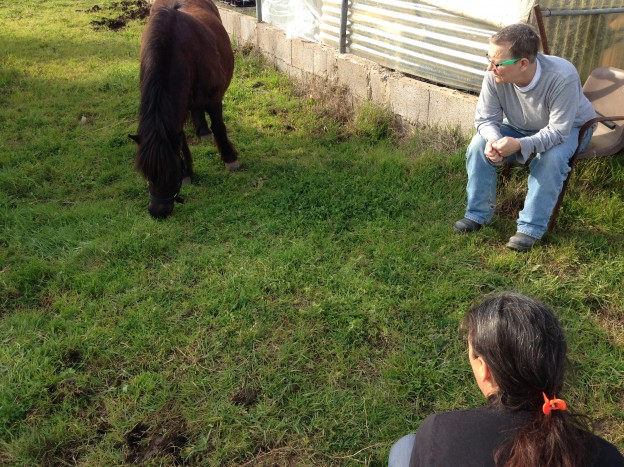In Rome, I had the great pleasure of visiting Il Grattacielo, a new sanctuary founded by ecofeminists determined to work intersectionally. Dedicated to anti-speciesism, anti-capitalism, social support, ecosystem protection, and cultural change, the sanctuary and its extensive organic gardens are located on a property also occupied by a community garden for seniors and a refuge for immigrant youth facing deportation at age 18 if they cannot demonstrate integration into pro-social activities. A few of the youth already have elected to help out at the sanctuary, and the hope is that, as the project grows, it will offer more opportunities for enjoyable and meaningful work that will satisfy the demands of immigration authorities.
Here’s how Barbara, one of the founders of the sanctuary, describes its ethos and praxis:
We are convinced that there will never be human liberation from oppression and discrimination without a simultaneous political process of non human animals liberation, slaves isolated in farm, vivisection, zoo, circus cages. The mental and cultural routes that lead to forms of intrahuman discrimination are the same that justify and perpetuate the enslavement of non human animals on this earth.
Il Grattacielo works through contiguity and proximate action.
The animal and earth liberation groups in our territory are separated, don’t communicate. Very often it seems easier to sustain virtual campaigns far away rather than focus on critical situations in our own surroundings.
Il Grattacielo works on its own territory, We try to involve and engage people nearby as well as local independent groups.
Il Grattacielo is direct action. We analyse the territory and activate projects that aim at a mutual liberation, human and non human inter-liberation. This means participation in social struggles, working class resistance strikes, house-right struggles, through assistance and rescue initiatives such as social vegan lunches, organised with products of our ethical and non industrial gardens, auto-productions and fair market to finance our projects, creation of refuges for animals in occupied areas, animals escaped or subtracted from exploitation, local demos against circuses, socio-economic analysis of the industrial and non industrial farms, their impact on the animals and the territory, initiatives against urbanisation, building industry, and the building systems, against defacement of ecosystems, initiaves against traditional local festivals that include animal exploitation and torture.
Il Grattacielo must get into the everyday life and reality. The liberation initiatives, thanks to the local actions, must permeate the social fabric through open conferences, school projects, creation of didactic refuges (to let children meet different-from-them individuals), social jyms, vegan community trattorias, community markets with garden products.
My talk that night was at one of those vegan community trattorias, a lively eatery into which activists squeezed themselves for a two-hour lecture that began at 9 p.m. and then stayed, spilling out onto the sidewalk in animated conversations, until past midnight. Also in Rome, I met members of a lesbian-feminist collective who use their weekly radio show not only to talk about feminist and LGBTQ issues but also animal concerns. One of the members of that collective, Maria Grazia, graciously housed and fed me, sharing olives from her family’s trees and preparing the most delicious pan-fried seitan I have ever tasted.
The day after my talk in Rome was my one talk-and-travel-free day. I used it to catch up with journalist and activist Marinella Correggia, with whom I discussed our perennial worry (activist tactics that are demonstrative but not effective) while walking in and around the most cosmopolitan plaza in Rome (Piazza Vittorio). There, in a fruit and vegetable market bursting with affordable fresh fruits, vegetables, and greens as well as bags of bulk rice, lentils, and beans of all varieties, I reflected on how much easier veganism would be if everybody had access to such bounty.
